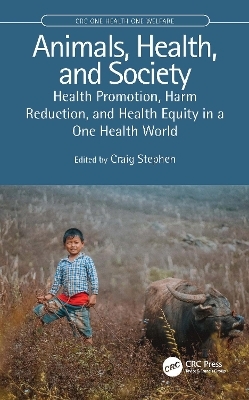
Animals, Health, and Society
CRC Press (Verlag)
978-0-367-64260-0 (ISBN)
CHOICE Recommended title 2022
This timely book reframes the historic narrative of people, animals, and nature as risks to each other, to one where we think about health as a shared capacity. This new narrative promotes the positive contributions made to health across species and generations and addresses growing calls to shift from a reactive to proactive approach in One Health.
Editor Craig Stephen takes the reader on a tour of the situations wherein we can all, regardless of our job description, work across species, sectors, and generations to motivate action. Perspectives and methods from a variety of fields and experts are shared and adapted to promote collaborative understanding of and action on determinants of health at the animal-society interface. Case studies demonstrate that the principles and practices presented are feasible, empowering people to make choices that concurrently benefit the health of animals, societies, and ecosystems.
The first book to adapt and explain health promotion, harm reduction, and health equity issues in a One Health context, and in terms of animal health, this is necessary reading for students of and practitioners working in planetary health, conservation, ecohealth, public health, health promotion, veterinary medicine, and animal welfare.
Craig Stephen has been working at the interface of human, animal, and environmental health for over 25 years. He most recently was a Professor at the Western College of Veterinary Medicine at the University of Saskatchewan and a Clinical Professor at the School of Population and Public Health at the University of British Columbia. He has held a variety of adjunct and affiliate academic positions including as an adjunct professor at the Ross University School of Veterinary Medicine. Craig is a veterinarian and epidemiologist who has held a variety of One Health leadership positions including being the founding president and director of the Centre for Coastal Health, the scientific director of the Animal Determinants of Emerging Diseases Research Network, the Scientific Director of the British Columbia Occupational and Environmental Health Network, a Canada Research Chair in Integrating Human and Animal Health and the CEO of the Canadian Wildlife Health Cooperative. His work has focussed on applying population health principles to a variety of human, wildlife, fish and domestic animal populations dealing with issue from food sustainability and poverty reduction to conservation to emerging environmental threats.
Part 1 - Making the case for health and reciprocal care
1. The call to action.
2. Whose health?
3. Health equity in One Health.
4. Health promotion as a foundation for reciprocal care and collective action.
Part 2 – Core Concepts
5. Working together for WHOLE systems: Approaching well-being and health, while oriented to living systems and equity.
6. Harm reduction for reciprocal care.
7. Building health surveillance for decision support at the animal, human, environment nexus.
8. Traversing the eco-healthscape: The final frontier in understanding shared determinants of health at the animal-society interface.
9. Helping people make healthy decisions for themselves, animals, and nature.
10. Expanding the concept of healthy public policy for animals, health, and society.
11. Practical approaches to leadership and One Health.
12. Bridging the knowing to doing gap to support One Health action.
13. Complex systems thinking in health.
Part 3 - Actions and Applications
14. Everything is connected: Integrating First Nations perspectives and connection to land into population health reporting.
15. Conserving nature for health protection and climate change resilience.
16. Managing zoonotic disease in wildlife populations: Priorities and pitfalls of the human connection.
17. Navigating social norms and animal welfare in hunted animals.
18. Healthy animals for sustainable livelihoods and poverty alleviation.
19. Application of harm reduction thinking to the conservation of uncharismatic species.
20. A Caribbean call to action: Behaviour change strategies to reduce local plastic waste.
21. Living with rats: Could an ecosystem lens provide new insights into urban rat control?
22. Making a case for harm reduction in invasive species management: The St. Kitts "monkey problem".
23. Socio-economic and behavioural dimensions of antimicrobial use and resistance in animals.
| Erscheinungsdatum | 15.01.2021 |
|---|---|
| Reihe/Serie | CRC One Health One Welfare |
| Zusatzinfo | 31 Tables, black and white; 30 Illustrations, black and white |
| Verlagsort | London |
| Sprache | englisch |
| Maße | 152 x 229 mm |
| Gewicht | 453 g |
| Themenwelt | Studium ► Querschnittsbereiche ► Prävention / Gesundheitsförderung |
| Naturwissenschaften ► Biologie ► Zoologie | |
| Technik ► Umwelttechnik / Biotechnologie | |
| Veterinärmedizin | |
| Weitere Fachgebiete ► Land- / Forstwirtschaft / Fischerei | |
| ISBN-10 | 0-367-64260-3 / 0367642603 |
| ISBN-13 | 978-0-367-64260-0 / 9780367642600 |
| Zustand | Neuware |
| Haben Sie eine Frage zum Produkt? |
aus dem Bereich


